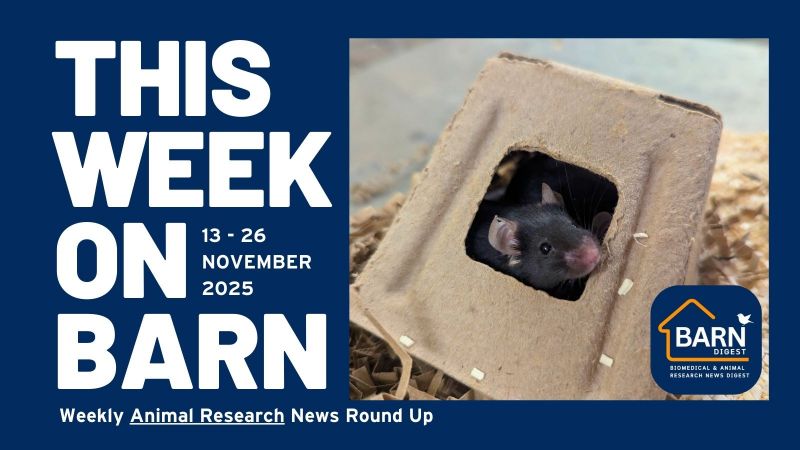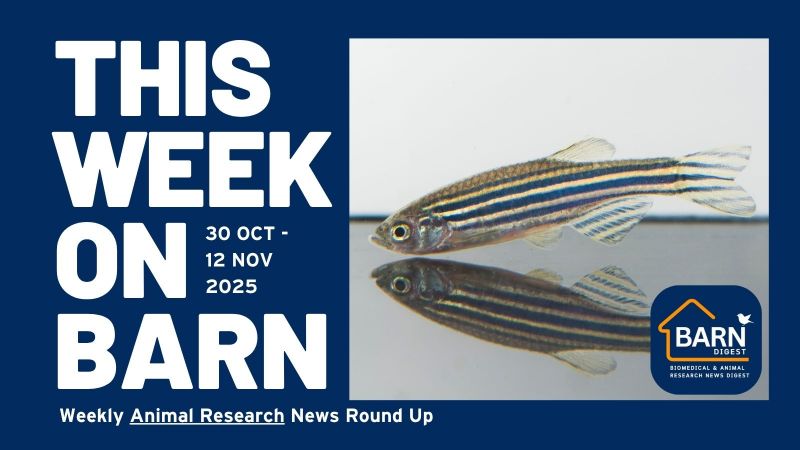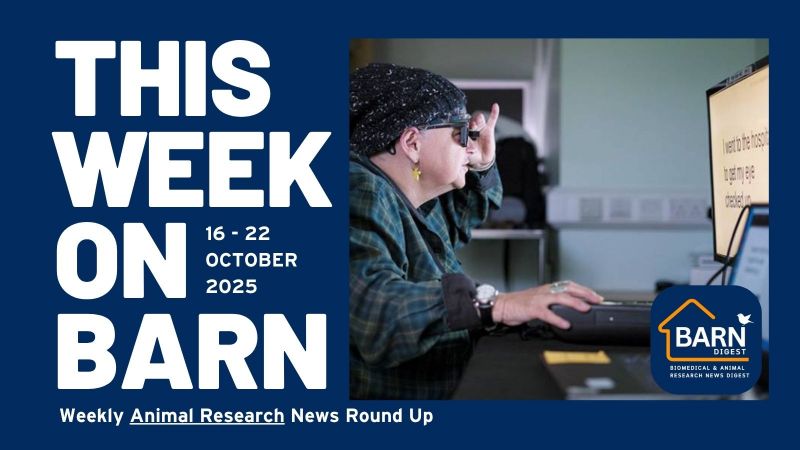
 The Biomedical Animal Research News (BARN) Digest collates animal research news from UAR’s 150+ member organisations into one, easy to access, feed. These animal research related stories include topics such as: medical studies and advancements; animal welfare and 3Rs news; funding, regulatory, and policy news; and conservation and environmental research that involves animal testing.
The Biomedical Animal Research News (BARN) Digest collates animal research news from UAR’s 150+ member organisations into one, easy to access, feed. These animal research related stories include topics such as: medical studies and advancements; animal welfare and 3Rs news; funding, regulatory, and policy news; and conservation and environmental research that involves animal testing.
Each week, we pick the most interesting, groundbreaking, and important news to feature in a weekly news roundup. In this round up we feature news stories from 21 - 28 May 2025.
View BARN to see daily news updates from UAR members.
BASIC RESEARCH
Different versions of APOE protein have varying effect on microglia in Alzheimer's disease
KING'S COLLEGE LONDON | MICE
"In this study, researchers looked at APOE in microglia, the brain's immune cells known to play a role in Alzheimer's disease. As the three versions of APOE are evolutionarily unique to humans, they can't be directly studied in a mouse brain, posing a challenge to studying them in a laboratory setting.
To overcome this, researchers developed a human "xenotransplantation model". This is where human microglia were grown from stem cells, manipulated to express different APOE versions, then transplanted into the brains of mice that had developed a buildup of amyloid plaques. The microglia were then isolated and analysed for their gene expression (using a technique called transcriptomics) and for their chromatin accessibility (how accessible the DNA is for genes to be expressed).
The researchers uncovered widespread changes to the transcriptomic and chromatin landscape of microglia, dependent on the APOE isoform expressed. The largest differences were observed when comparing the APOE2 and APOE4 microglia. "
Sussex scientists find ‘off switch’ that could turbo-charge cancer immunotherapy and prolong lives
UNIVERSITY OF SUSSEX | MICE
From the article: "A new study published today (Friday 23 May 2025) by the University of Sussex and Zhejiang Chinese Medical University reveals that blocking a protein known as LMTK3 can prevent breast cancer tumours from turning immune cells into 'friends’. "
https://www.sussex.ac.uk/broadcast/read/68174
From the study: "To elucidate the mechanism through which LMTK3 impacts endosomal trafficking and regulates EV biogenesis, we used a variety of approaches, including in vitro kinase assays, confocal and electron microscopy, as well as in vivo subcutaneous and orthotopic breast cancer mouse models."
https://molecular-cancer.biomedcentral.com/articles/10.1186/s12943-025-02346-2
Beyond the genome: Harnessing the power of super-enhancers for blood cancer
CANCER RESEARCH UK | MICE
From the article: "Recent breakthroughs have revealed that the guardians of cell identity often reside in the vast non-coding regions of the genome where clusters of enhancers – aptly named super-enhancers – exert extraordinary regulatory control. These powerful elements, first described in the baculovirus genome and later in mouse embryonic stem cells, coordinate the high-fidelity expression of genes that define cell identity."
REGULATORY RESEARCH
How we protect the UK from vector-borne diseases like dengue and West Nile virus
UK HEALTH SECURITY AGENCY | DISEASE OUTBREAK PREVENTION
“Vector-borne diseases - illnesses transmitted to humans by organisms such as mosquitoes and ticks - account for more than 17% of all infectious diseases globally, causing over 700,000 deaths annually. They include malaria, West Nile virus, dengue and yellow fever. At UKHSA, our medical entomology teams play a vital role in monitoring and assessing new species and diseases that could threaten public health."
https://ukhsa.blog.gov.uk/2025/05/21/how-we-protect-the-uk-from-vector-borne-diseases/
STUDY DESIGN
Let's Talk About Sex (Bias in Preclinical Research)
CHARLES RIVER EUREKA BLOG | STUDY DESIGN | PODCAST
“Sex discrimination is not just something that happens with people. In many animal studies, males have historically been used more often than females. Take our quiz to learn how much you know about how sex bias influences preclinical research studies. If your interested in learning more about this topic, check out our Sounds of Science podcast."
https://ukhsa.blog.gov.uk/2025/05/21/how-we-protect-the-uk-from-vector-borne-diseases/
ANIMAL BEHAVIOUR
What’s it like being a raven or a crow?
UNIVERSITY OF READING | ANIMAL BEHAVIOUR & COGNITION
“Birdbrain” used to be a common insult but corvids have such surprising intelligence that they are sometimes described by scientists and journalists as “feathered apes”. But we wanted to go beyond intelligence. To do this we examined five dimensions of their experience by combing through studies on their behaviour, cognition, brains, emotions and consciousness."
https://research.reading.ac.uk/research-blog/2025/05/27/whats-it-like-being-a-raven-or-a-crow/
Visit BARN for daily news updates
Last edited: 20 October 2025 13:21



